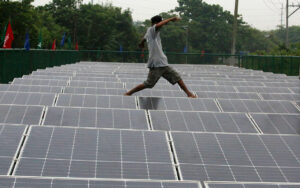By Justine Irish D. Tabile, Reporter
THE Philippines can access a potential export market of $788.4 million for its solar photovoltaic (PV) modules if it properly addresses the non-tariff barriers hindering the trade, the Philippine Exporters Confederation, Inc. said.
“For specialized solar components, the solar PV modules, the Philippines has room to expand its exports to the US ($189.4 million), China ($171.6 million), the Netherlands ($64.7 million), Vietnam ($46.4 million), and Germany ($43 million),” the export group said.
According to the International Trade Centre (ITC), the Philippines needs to fill data and information gaps, engage with manufacturers and traders of solar components, and focus export promotion efforts and export strategies on high-potential RE components to tap the potential of solar PV exports.
To address information gaps, the ITC proposed the development of market intelligence tools to “enable businesses to identify export opportunities and to enhance transparency around requirements in foreign markets.”
Meanwhile, it said that engaging with manufacturers and traders will help in understanding the nature of support and capacity businesses need comply with the requirements in export markets.
ITC said that exporters’ ability to comply with the non-tariff requirements in the potential markets is what will determine their market access, as access to major markets is duty-free.
“To tap into this potential and boost market share, they need to invest in building a strong capacity to comply with both technical and non-technical regulations,” it added.
ITC also proposed the development of regulation and standards for RE goods, investment in regional value chains for RE goods and services and in quality infrastructure and skills development, and promotion of foreign investment in RE value chains.
“Helping countries establish national regulatory standards on these goods through the adoption of international standards can improve the level of quality and safety of RE products and technologies, facilitating local deployment as well as exports,” it added.
ITC also noted that countries should leverage trade agreements to attract foreign investment in renewable energy and ease the entry of professionals and exports.
“When used effectively, tariff and non-tariff trade tools can encourage easy access to RE goods (imports) as well as access to promising markets (exports). To the extent possible, developing countries should try to negotiate these requirements effectively under various trade agreements,” it added.

